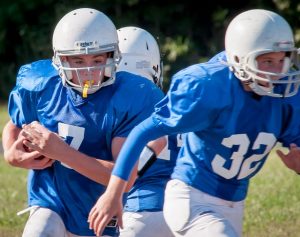Fall sports mean increased chances of your child losing teeth. Here’s how to protect them

When your children are young, losing a tooth is considered cute and a rite of passage, ending with a visit from the tooth fairy. But when they are older, the last thing they want is to lose a tooth and look like they are younger than they actually are. Unfortunately, during fall sports season, we tend to see more children being at risk for injuries to their teeth.
But you can do something about it to help protect your children:
Get them a properly fitting mouthguard.
Mouthguards help minimize the risk of broken teeth and injuries to a child’s lips, tongue, face or jaw. They typically cover the upper teeth and are a great way to protect the soft tissues of the tongue, lips and cheek lining.
How Important is a Mouthguard for sports?
When it comes to protecting your mouth, a mouthguard is an essential piece of athletic gear that should be part of your standard equipment from an early age.
While collision and contact sports, such as boxing, are higher-risk sports for the mouth, any athlete may experience a dental injury in non-contact activities too, such as gymnastics and skating.
But you want to make sure you have the right mouthguard for you and your specific sport.
There are Differences in the Types of Mouthguards
The best mouthguard is one that has been custom made for your mouth by your dentist. They may be more expensive than the other versions because they are individually created for fit and comfort.
Other types include “boil and bite” and can be bought at many sporting goods stores and drugstores and may offer a better fit than stock mouth protectors. They are first softened in water (boiled), then inserted and allowed to adapt to the shape of your mouth.
Then you have stock mouthguards. These are inexpensive and come pre-formed, ready to wear but often don’t fit very well and can make breathing and talking difficult.
Specially Fitted for Protecting Braces
A properly fitted mouthguard may be especially important for people who wear braces or have fixed bridgework. That’s because a blow to the face could damage the brackets or other fixed orthodontic appliances. A mouthguard also provides a barrier between the braces and your cheek or lips, which will help avoid injuries to gums and cheeks.
Talk to your dentist or orthodontist about selecting a mouthguard that will provide the right protection. Although some mouthguards only cover the upper teeth, your dentist or orthodontist may suggest that you use a mouthguard on the lower teeth if you have braces on these teeth.
Of course, if you have a retainer or other removable appliance, do not wear it during any contact sports.
To find out how to get a specially fitted mouthguard for your athlete, make an appointment with the experts at Longmeadow Family Dental Care.

